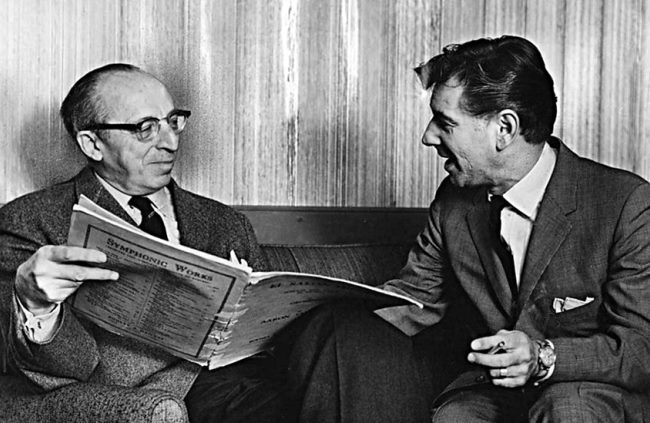Leonard Bernstein, Symphony No. 3, Kaddish
by Byron Adams
Born August 25, 1918, in Lawrence, Massachusetts
Died October 14, 1990, in New York City
Composed in 1961–63; Revised in 1977
Premiered on December 10, 1963 in Tel Aviv by the Israel Philharmonic conducted by Leonard Bernstein with mezzo-soprano Jennie Tourel
Performance Time: Approximately 41 minutes
As Leonard Bernstein’s biographer Humphrey Burton notes, “Between 1957 and 1971, the year of the Mass, [Bernstein] completed only two works: the Kaddish Symphony (No. 3) of 1963 and the Chichester Psalms of 1965.” There were several reasons for this slim output: the pressures of a thriving conducting career; the challenges of responding to the American musical modernist aesthetics of the time, which favored Schoenberg’s twelve-tone technique; and the composer’s own exacting self-criticism. Of these two works, the largely cheerful and extroverted Chichester Psalms has remained popular. In contrast, the Kaddish Symphony is seldom performed, partly because of its fierce, dark introversion and partly because it requires a narrator, a large orchestra, a soprano soloist, and a chorus.
Bernstein’s inimitable compositional voice pervades the Kaddish Symphony. Although it flirts with the twelve-tone technique, the piece is full of traits that characterize much of Bernstein’s music: glittering orchestration, tonal lyricism, and American dance rhythms. Unlike the Chichester Psalms, however, the Kaddish Symphony is shadowed by its composer’s ambition as explicitly articulated in the score’s narration.
Bernstein fashioned the Kaddish Symphony’s narration in the manner of the Book of Job, in which God’s decrees are harshly challenged. As Jack Gottlieb observes, “This Speaker’s text dominates the symphony and is woven into the fabric of the music (although some listeners have expressed the desire to hear the music without it. I, for one, find a few of its passages “purple” and some of its similes obvious).” For some listeners, the text’s self-conscious oratory proved to be an impediment; others were unruffled.
Although it was generally lauded upon its premiere in Israel, American critics lambasted the symphony when the Boston Symphony Orchestra, conducted by Charles Munch, first presented it in the United States on January 10, 1964. Although the Kaddish Symphony was completed before President Kennedy’s assassination on November 22, 1963, Bernstein reverently dedicated the score to his memory.
Byron Adams is a Professor of Musicology at the University of California, Riverside.

